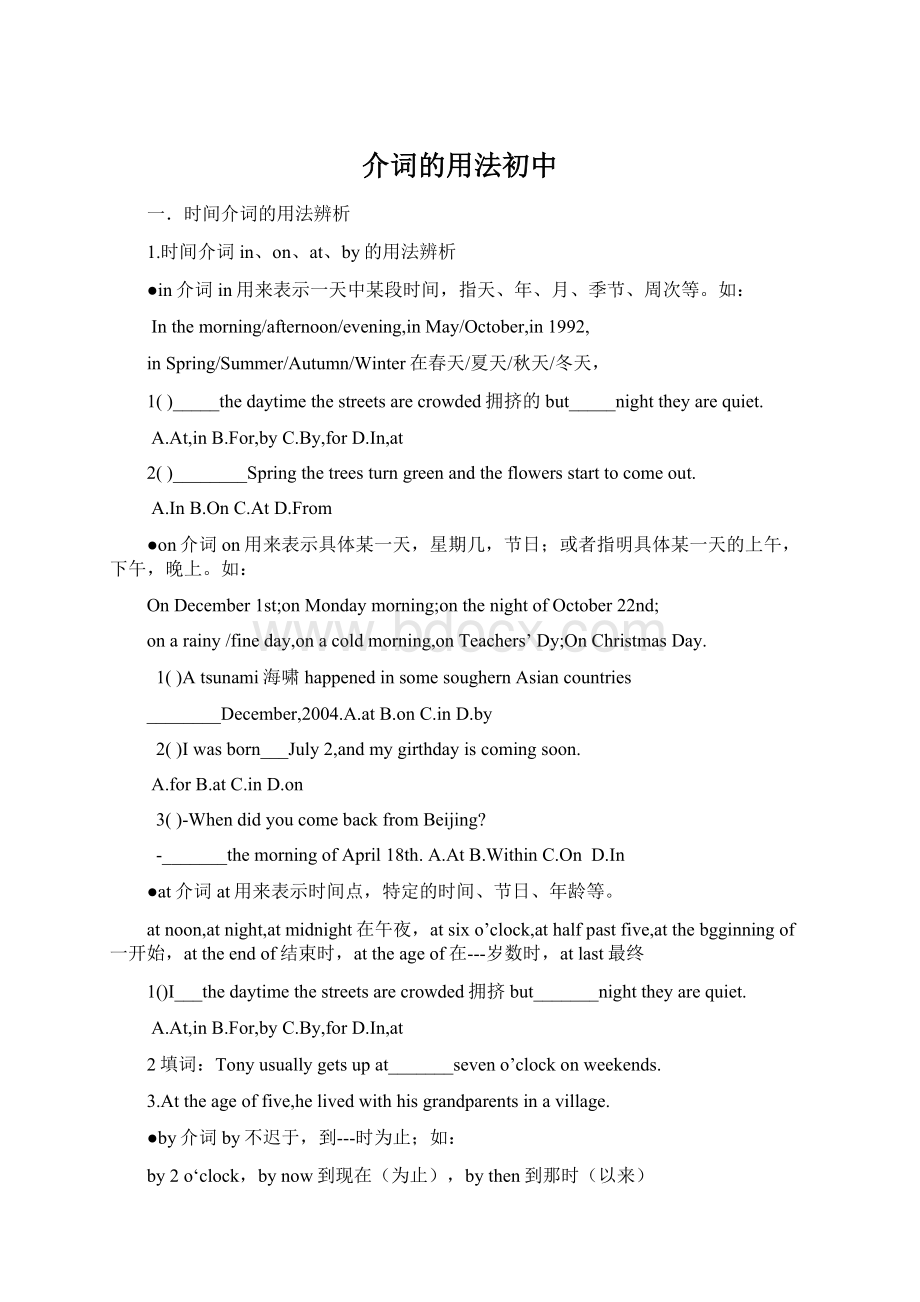介词的用法初中.docx
《介词的用法初中.docx》由会员分享,可在线阅读,更多相关《介词的用法初中.docx(15页珍藏版)》请在冰豆网上搜索。

介词的用法初中
一.时间介词的用法辨析
1.时间介词in、on、at、by的用法辨析
●in介词in用来表示一天中某段时间,指天、年、月、季节、周次等。
如:
Inthemorning/afternoon/evening,inMay/October,in1992,
inSpring/Summer/Autumn/Winter在春天/夏天/秋天/冬天,
1()_____thedaytimethestreetsarecrowded拥挤的but_____nighttheyarequiet.
A.At,inB.For,byC.By,forD.In,at
2()________Springthetreesturngreenandtheflowersstarttocomeout.
A.InB.OnC.AtD.From
●on介词on用来表示具体某一天,星期几,节日;或者指明具体某一天的上午,下午,晚上。
如:
OnDecember1st;onMondaymorning;onthenightofOctober22nd;
onarainy/fineday,onacoldmorning,onTeachers’Dy;OnChristmasDay.
1()Atsunami海啸happenedinsomesoughernAsiancountries
________December,2004.A.atB.onC.inD.by
2()Iwasborn___July2,andmygirthdayiscomingsoon.
A.forB.atC.inD.on
3()-WhendidyoucomebackfromBeijing?
-_______themorningofApril18th.A.AtB.WithinC.OnD.In
●at介词at用来表示时间点,特定的时间、节日、年龄等。
atnoon,atnight,atmidnight在午夜,atsixo’clock,athalfpastfive,atthebgginningof一开始,attheendof结束时,attheageof在---岁数时,atlast最终
1()I___thedaytimethestreetsarecrowded拥挤but_______nighttheyarequiet.
A.At,inB.For,byC.By,forD.In,at
2填词:
Tonyusuallygetsupat_______seveno’clockonweekends.
3.Attheageoffive,helivedwithhisgrandparentsinavillage.
●by介词by不迟于,到---时为止;如:
by2o‘clock,bynow到现在(为止),bythen到那时(以来)
1.Bytheendoflastmonth到上个月末为止,Wehadlearnedmorethan不止300Englishsongs.
2.Byhegotoutside到他来到外面为止,thebushadalready已经left离开.
3.TheworkmustbefinishedbyFriday。
工作必须在星期五之前完成
●in与after时间介词in与after的用法
*介词in+一段时间用于一般将来时。
如:
1.We’llgotoschoolintwoweeks.两周后
2()Mymotheriscomingback______threedays我妈三天后要回来
A.afterB.inC.atD.until
3.Therewillbemorerobot机器人athomeinfiftyyears.五十年后
*介词after+一段时间用于一般过去时。
如:
1()Mymothercamehome_______halfanhour.半小时后
A.inB.afterC.behindD.with
2()Theheadmaster校长willcometoourclass_____twoo’clock.
A.inB.ofC.forD.on
3()I’llcallyou______4o’clock.A.inB.onC.ofD.after
4.We’llgooutforawalkaftersupper.晚饭后
5()Thetrainisstarting_____fiveminutes.A.inB.atC.after
●Since与for时间介词for与since的用法辨析
*介词for表示一段时间,fortwomonths有两个月,forthreedays有两天,forafewhour有好几个小时,foralongtime有一段时间,
1.Ihavebeenlivingherefor10years.有十年
2()-Howlonghaveyoubeeninthiscity?
/-_______twentyyears.
A.BeforeB.AfterC.ForD.Since
3()Thedoctorworked____fivehours_____arest.
A.for,withB.on,withoutC.about,havingD.for,without
*介词since表示从过去某一时间以来,如:
1()Ihavebeenlivinghere_______2000.
A.forB.befroeC.sinceD.in
2()Whatbadweatherwehave!
Ithasrained____thedaybeforeyesterday.
A.onB.inC.sinceD.at
3.Thefactoryhasbeentheresince1989.
4.HehaslearningEnglishsincehewas8.他自从八岁时就开始学英语
5.Ihaven’tseenherforyears.我有好几年没见到他了
●during时间介词during(在…期间)
1.Heswimseverydayduringthesummer.在夏天期间
2()Theyoungmanhadworkedinthesmallvillage____theyearof1972.
A.duringB.onC.forD.by
●until/till直到…为止;not…until…直到…才…,不到…不…,
*till/until前谓语动词为延续性动词;
*not…until…,(until)前谓语动词为短暂性动词,
1.Iwillwaittill(until)seveno'clock.
2.You’dbetterstayinbedtilltomorrow.你最好在床上一直呆到明天
3()Tomdidn'tcomeback________midnight.
A.beforeB.untilC.afterD.when
4.Ididn’tgotobed________mymothercameback.
A.beforeB.untilC.afterD.since
●不用介词表达时间的几种情况
1.当表示时间的词前有this,that时,其前面不用介词,如:
thismorning
2.当表示时间的词前有next时,其前面不用介词,如:
nextSunday
3.当表示时间的词前有last时,其前面不用介词,如:
lastSunday
4.当表示时间的词前有one,any,each,every,some或all时,其前面不用介词
1.Youcancomeanyday任何一天.
2.Couldyoucometomyhouse_______evening?
A.atB.lastC.atthisD.at
二.方位介词与地点介词的用法辨析
●方位介词on,over,above的用法辨析
*介词on表示一物放在另一物上面,两者紧贴在一起,如:
1.Thebookisonthetable.
2.Therewasacarpet地毯onthefloor在地板上.
*介词over表示一种垂直悬空的上下关系,即“在…上方”,如:
1.Isthereanybridgeovertheriver?
桥在河流之上吗?
*介词above表示一般的“高于…”,“在…之上”,如:
1.Therewasanelectricclock电子钟abovehisbed.
2.Thereisalight灯______hishead.A.overB.aboveC.on
●方位介词under与below的用法辨析
*介词under是over的反义词即“在…下方”,如:
1.Theywereseenunderthetree.
*介词below是above的反义词即“低于…”,“在…之下”,如:
1.Theylivebelowus.他们住在我们下面(楼下)
●方位介词across,、through、over,用法辨析
*介词across着重于“从一头或一边到另一头或另一边”,强调从表面穿过。
1.Shewentacrossthestreet穿越街道todosomeshoppng.
2.MrWangplannedtoswim______theChangJiangRivernextmonth.
A.throughB.acrossC.pastD.over
4.Thewent________thedesert沙漠lastyear.
A.throughB.acrossC.overD.past
*介词through着重于“穿越”,强调从一定的空间内部穿过。
1.Thesunlightwascominginthroughthewindow.
2.Theywent________theforest森林tofindthewaytothePalace.
A.acrossB.throughC.overD.past
*介词over多表示从“上方越过”,如:
1.Hefailedtogooverthemountain穿越大山;hehadtogoroundit.
●方位介词in、on、at的用法辨析
*介词in表示“在---内”,“排、行、组”,如:
1.WeareinTeamOne.
2.Heputshishandsinhispockets口袋
*介词on表示“在左、右”,在上面,如:
1.LiPingisonmyleft/right在右边,在左边.
*at“在旁边”
1.Theywereeatingatthetablenow在饭桌旁吃饭
*at后接小地方,in后接大地方
词汇:
athome在家,atthebusstation在车站,atscholl,atwork在上班,
attheendof在---尽头,atthebeginningof一开始---;inChina,inBeijing,
intheworld在这个世界,intheopenair在户外,intheend最终,
stayinbed卧床睡觉,
1()Whendidyouarrive_____thetrainstation?
A.inB.atC.onD.infront
2()Hewasborn_____Wuhan.A.atB.inC.onD.of
3填词:
MaryisflyingtoFrancesoon,shewillarrive____Paris____themorningofJuly9.
4()Wewaitedagesforataxi,Wegaveup放弃_____andwalkedhome.
A.atthebeginningB.intheendC.atfirstC.atleast
5.Helives______asmallvillage.A.inB.onC.forD.in
*in表示在某地范围之内;to表示在某地范围之外;
on表示与某地相邻或接壤。
如:
1.Shanghaiis/liesin位于theeastofChina.上海在中国的东部。
BeijingisinthenorthofChina.
2.Japanis/liestotheeastofChina.日本位于中国的东面。
FranceliestothesouthofEngland.
3.Mongoliais/liesonthenorthofChina.蒙古国位于中国北边。
CanadaliesonthenorthoftheU.S.
●方位介词to、for的用法辨析
*介词to表示目的地或去的目的,“from---to---”从---到---,如:
1.willyoutakeatraintoTianjian?
2.填词:
-Howfarisit_______yourhometoschool、
-It’sabouthalfanhour’sbusride.
3.填词:
Myfatherworksinafactory________Monday____Saturday.
*介词for表示目的,动身去某地等,如:
1.HegotonatrainforShanghai.
2.Thetrainisleaving_____Tianjingat6pm.A.toB.forC.at
3.填词:
Hereisaletter____you。
这是给你的信件
Iboughtsomeflowersas作为apresent礼物_____Teachers’Day.
三.其他易混介词的用法辨析
●原因介词because、as、for的用法辨析
*介词because表示“因为;由于”指直接的,用来回答why的问句,语气最强。
1.Theboydidn’tgotoschoolyesterdaybecausehewasill.
*介词as表示“由于”指一种显而易见、谈话双方已知的理由。
1.Shestayedathomeasshehadnocar.
*介词for表示“因为,由于”指一种间接原因,
1.Itmusthaverainedlastnight,fortheroadiswet路面湿滑.
●材料介词of和from的用法
*bemadeof“由---制成”,用于成品与材料的性质不变时,
1.Thedeskismadeofwood.课桌由木头制成。
2.Thesocksaremadeofsilk.袜子有丝绸制成。
*bemadefrom“由---制成”,用于成品与材料的性质已变时,
1.Wineismadefromgrapes.酒由葡萄制成。
2.Paperismadefromwood.纸由木头制成。
●表示“用”的介词in、with、by的用法辨析
*介词in表示“用材料、声音,语言”
介词with表示“用工具、某物”
介词by表示“用、以、靠、通过…方法”
1.CanyousayitinEnglish?
用英语说
2.Idrawapicturewithacolorpen.用彩色笔写字
3.Thegirlmademoneybysellingflowers.女孩通过卖花来赚钱
●介词between与among的用法辨析
*介词between表示“在两者之间”
介词among表示“在…当中(三者或以上)之间
1.Don’tsitbetweenthetwogirls.
2.Thereisahotelbetweenthebankandthepayphone.
3.Theylivedamongthemountains群山之间inthepast.
4.Thebadnewsspread传播amongthestudents在学生间quickly.
●介词besides与except的用法辨析
*介词besides表示“除…之外(全部包括在内)”
介词except表示“除…之外(不计算在内)
1.WehaveseenthecrocodilebesidesLiFang.
2.WeareallChineseexceptTominourclass.
3.Thirtystudentswenttothecinemabesideshim.
除他以外,还有30个学生去看了电影。
(他和另外30人都去了)
4.Heisinterestedintennisbesides(=aswellas)football.
除了足球,他还对网球感兴趣。
5.Everyoneisexcitedexceptme.
除我以外的每个人都很激动。
(他们激动,而我却不激动)
6.AllthevisitorsareJapaneseexcepthim.
除他以外的所有游客都是日本人。
(其他人是日本人,可他不是)
●表示计量的介词:
at,for,by
*at表示“以……速度”“以……价格”
For表示具体价格,
by表示“以……计”,后跟度量单位。
1.Itflies飞atabout900kilometersahour.它以每小时900公里的速度飞行。
2.Isoldmycaratahighprice.我以高价出售了我的汽车。
3.Wehavesweatersatagoodprice.以优惠价
4.Hesoldhiscarfor500dollars.他以五百元把车卖了。
5.Theypaidhimbymonth.他们按月给他计酬。
6.Hereeggsaresold被卖byweight.在这里鸡蛋是按重量卖的。
●表示工具或手段的介词:
by,with,on
*by用某种方式,多用于交通。
如bybus乘公共汽车,bye-mail.通过电子邮件。
(注:
表示搭乘交通工具时,用by时不用冠词,用in时要用冠词)
1.Iwentthere(bybus/inabus).我是坐公共汽车去的那儿。
*with表示“用某种工具”。
1.Hebrokethewindowwithastone.他用石头把玻璃砸坏了。
*on表示“以……方式”,多用于固定词组。
1.Theytalkedonthetelephone.他们通过电话进行交谈。
2.ShelearnsEnglishontheradio/onTV.她通过收音机/电视学英语。
3.HeenjoyswatchingsoccergameonTv.
●表示“关于的介词”:
of,about,on
*thinkof/about认为,觉得
1.Whatdoyouthinkof/about认为,觉得Chinesefood./-Ithinkit’sgreat.
2.Hethoughtabout考虑thismatteryesterday.他昨天考虑了这件事。
*about“关于”某人某事的情况和内容
1.Canyoutellmesomethingaboutyourself?
你能告诉我一些关于你自己的事情吗?
2.Theyaretalkingabout谈论关于(animals/Chinesemovies)
*on指“关于”学术性的或严肃的事。
1.It’satextbookonthehistoryofchina.它是一本有关中国历史的教科书。
●表示原因:
*becauseof“由于”,表示引起结果的直接原因。
*Thanksto表示引起某种幸运结果的原因,常译为“幸亏……,多亏……”
1.Heretired退休lastmonth(becauseofillness疾病/becausehewasill).
2.ThankstoJohn,wewonthegame.多亏约翰,我们才赢了这场比赛。
3.Thankstothedoctor,mysisterwastakengoodcareof.
多亏了医生,我妹妹得到了很好的照顾。
4.Tomstayedinbed卧病在床(becauseofhisheadache/becausehehadaheadache.)■表示好像或当作的介词:
like,as
●*like表示“像……一样”,
*as表示“作为,以……身份而工作”
1.Iwanttobuyasweaterlike像this我想要买一件像这样的毛衣。
2.Couldyoudoitlikethis?
你可以像这样做这件事吗?
3.Hetalkedtomeasafather.他以父亲的身份跟我谈话。
4.Shewantstofindajobasateacher/driver.
5.Thewomanworksasadoctorinahospital.
●表示支持或反对的介词
*against反对;for支持
1.Areyouformyideaoragainstit?
你赞同还是反对我的想法?
中考介词专项训练:
1.Tomwasgood______playingtheguitar,butnowheplaystheviolinwell.
2.Jennyisbetter______drawingthansinging.
3.pleasedon’tlaugh_____her.sheonlymadeasmallmistake.
4.LastSunday,hestaye